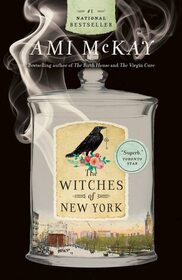This is the second novel I've read by this author, whose work capably incorporates elements of the historic and fantastic. This isn't the typical genre I read, but it came recommended, so I thought I would give it a try. I'm not a great fan of supernatural-type fiction, but because there is a curious mix of elements, it generally works somehow.
This creative novel takes place in Victorian-era New York City, where a duo of conjurers/tea proprietors hire a mysterious young ingenue, whose abilities may surpass even their own. In an era of pretenders and scam artists, persons with genuine abilities are rare. In the little tea shop, however, this collection of sensitives/seers serve the women of New York City, at their establishment, Tea and Sympathy (there actually IS a tea shop called Tea and Sympathy, in New York City, but I don't think tea leaves are read... unless someone knows something I don't!).
The characters are well-developed, with rich depth and real personality. The story is fairly complex as well, which keeps it interesting, even if it lags somewhat at times. It does, however, do an admirable job of describing the lot of women of the era, if in a covert yet subversive manner, much like the characters.
Women may no longer have been burned at the stake or hanged for practicing witchcraft (indeed, the "spiritualism" craze of the late nineteenth century was in full swing, when seances and such events were a regular appearance even at upper-class functions), but powerful women were still looked upon with disdain, especially if they weren't attached to a male figure, be it a father or husband. There is also the undercurrent of threats by men, both by the controllers of other women, in the form of Eleanor's occasional love interest, and a twisted reverend, who sees it as his personal mission to rid the world of "witches," even those engaged in innocent activities, including children.
The "fantastic" element, including talking ravens, ghosts, spirits and other supernatural creatures isn't over the top, keeping much of the narrative rather believable and relatable. It's also filled with tangible practices, which women often engaged in (and still do) as a means to attempt to exert control over their own lives and destinies. The novel portrays the practices as more nature-based, with the use of herbal medicines and rituals grounded in the control of energies, which is a refreshing anchor in actual reality. Overall, this was a fun read in a genre with which I admittedly don't have a lot of familiarity.
This creative novel takes place in Victorian-era New York City, where a duo of conjurers/tea proprietors hire a mysterious young ingenue, whose abilities may surpass even their own. In an era of pretenders and scam artists, persons with genuine abilities are rare. In the little tea shop, however, this collection of sensitives/seers serve the women of New York City, at their establishment, Tea and Sympathy (there actually IS a tea shop called Tea and Sympathy, in New York City, but I don't think tea leaves are read... unless someone knows something I don't!).
The characters are well-developed, with rich depth and real personality. The story is fairly complex as well, which keeps it interesting, even if it lags somewhat at times. It does, however, do an admirable job of describing the lot of women of the era, if in a covert yet subversive manner, much like the characters.
Women may no longer have been burned at the stake or hanged for practicing witchcraft (indeed, the "spiritualism" craze of the late nineteenth century was in full swing, when seances and such events were a regular appearance even at upper-class functions), but powerful women were still looked upon with disdain, especially if they weren't attached to a male figure, be it a father or husband. There is also the undercurrent of threats by men, both by the controllers of other women, in the form of Eleanor's occasional love interest, and a twisted reverend, who sees it as his personal mission to rid the world of "witches," even those engaged in innocent activities, including children.
The "fantastic" element, including talking ravens, ghosts, spirits and other supernatural creatures isn't over the top, keeping much of the narrative rather believable and relatable. It's also filled with tangible practices, which women often engaged in (and still do) as a means to attempt to exert control over their own lives and destinies. The novel portrays the practices as more nature-based, with the use of herbal medicines and rituals grounded in the control of energies, which is a refreshing anchor in actual reality. Overall, this was a fun read in a genre with which I admittedly don't have a lot of familiarity.




